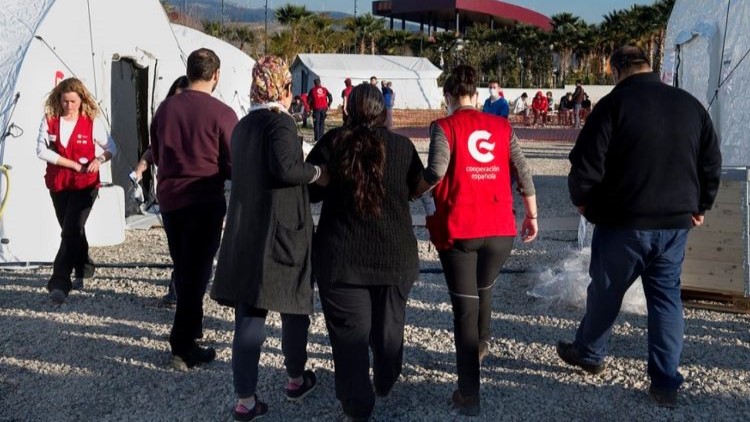The Diplomat
The Spanish Emergency Medical Team (START, Spanish Technical Aid Response Team) has returned to Spain after treating nearly 7,400 earthquake victims in Turkey for just over a month.
According to the Spanish Agency for International Development Cooperation (AECID), the team returned to Spain last Wednesday after completing the three rotations of “red vests” that have been deployed to attend the Spanish Cooperation field hospital in Arsuz Expo, on the outskirts of Iskenderun (Hatay), one of the cities most affected by the earthquakes.
From its opening on February 13 until March 17, the Spanish Cooperation field hospital provided emergency care services, adult and pediatric consultations, gynecology, traumatology, physiotherapy, surgery, hospitalization, radiology, laboratory and psychosocial support. This care enabled it to meet the hospital care needs of the population, whose access to health care had been cut off by the almost total destruction of health infrastructures at the local level.
In these 33 days of operation, 7,387 people were treated. To achieve this, the Spanish Emergency Medical Team was organized in three shifts -two relays- of medical personnel, logisticians and experts in humanitarian action from Spain, bringing together a total of 195 professionals during the entire deployment. The START field hospital treated an average of 224 patients per day. The exception to this average was between 20 and 21 February when a new earthquake occurred, measuring 6.4 on the Richter seismological scale, with its epicenter in the province of Hatay. At that time, about 400 patients were treated per day.
Each shift involved both health personnel from the Spanish public health system to care for patients and logisticians from Madrid Fire Department, SUMMA 112 and ERICAM, for the installation and maintenance of the camp and the field hospital; kitchen staff to feed both the hospital patients and the team, provided by the NGO Cesal; and experts in emergency humanitarian action from both AECID and the company Tragsa.
The START Team’s healthcare offer included psychological care by expert staff from Doctors of the World, as well as a technical assistant from the NGO Farmamundi for pharmacy management together with experts in hospital pharmacy from the National Health System. AECID also highlighted the work of the volunteer staff, mainly Turkish, who participated in this mission as interpreters in order to achieve a better understanding of the START health personnel and logisticians with the population. The medicines and consumables that were not used in the hospital, worth approximately 40,000 euros, were donated to the Turkish Emergency Response Authority (UMKE), which will continue to treat patients at the hospital site with a health care point.
In addition to the health care provided by the START Emergency Medical Team at the field hospital, the red vests delivered shelter and WASH (water, sanitation and hygiene) materials to a camp with about 1,000 earthquake victims in the vicinity of the hospital. In this camp, the START logistics team installed showers, ramps and four drinking water points. START also constructed disabled access to the camp toilets.
Southern Turkey and northwestern Syria were hit in the early hours of February 6 by an earthquake measuring 7.7 on the Richter scale, the strongest earthquake recorded in Turkey since 1939. The earthquake also severely affected northwestern Syria, a region where 4.1 million people are currently dependent on humanitarian assistance. As of March 10, more than 55,000 deaths had been recorded: 47,000 in Turkey and 7,000 in Syria.
The Turkish government issued an international appeal for assistance on February 6 itself and the Spanish offer to deploy the START Team was accepted by the Turkish authorities on the morning of February 7. The team arrived in Adana (Turkey) in the early hours of February 10. “In its deployment in Turkey, START has been greatly supported by the Turkish authorities and companies and by civil society, which have greatly facilitated the logistics of the team to achieve accelerated deployment and implementation of the field hospital in just 48 hours after its arrival on the ground,” said AECID.







